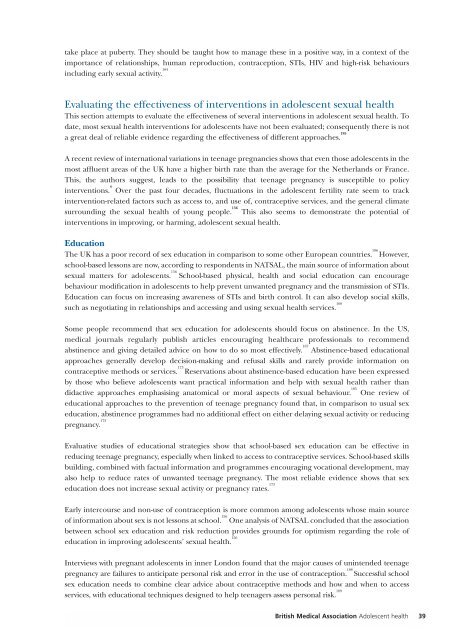Alcohol misuse: tackling the UK epidemic - London
Alcohol misuse: tackling the UK epidemic - London
Alcohol misuse: tackling the UK epidemic - London
You also want an ePaper? Increase the reach of your titles
YUMPU automatically turns print PDFs into web optimized ePapers that Google loves.
take place at puberty. They should be taught how to manage <strong>the</strong>se in a positive way, in a context of <strong>the</strong><br />
importance of relationships, human reproduction, contraception, STIs, HIV and high-risk behaviours<br />
including early sexual activity. 184<br />
Evaluating <strong>the</strong> effectiveness of interventions in adolescent sexual health<br />
This section attempts to evaluate <strong>the</strong> effectiveness of several interventions in adolescent sexual health. To<br />
date, most sexual health interventions for adolescents have not been evaluated; consequently <strong>the</strong>re is not<br />
a great deal of reliable evidence regarding <strong>the</strong> effectiveness of different approaches. 185<br />
A recent review of international variations in teenage pregnancies shows that even those adolescents in <strong>the</strong><br />
most affluent areas of <strong>the</strong> <strong>UK</strong> have a higher birth rate than <strong>the</strong> average for <strong>the</strong> Ne<strong>the</strong>rlands or France.<br />
This, <strong>the</strong> authors suggest, leads to <strong>the</strong> possibility that teenage pregnancy is susceptible to policy<br />
interventions. 4<br />
Over <strong>the</strong> past four decades, fluctuations in <strong>the</strong> adolescent fertility rate seem to track<br />
intervention-related factors such as access to, and use of, contraceptive services, and <strong>the</strong> general climate<br />
surrounding <strong>the</strong> sexual health of young people. 156<br />
This also seems to demonstrate <strong>the</strong> potential of<br />
interventions in improving, or harming, adolescent sexual health.<br />
Education<br />
The <strong>UK</strong> has a poor record of sex education in comparison to some o<strong>the</strong>r European countries. 186<br />
However,<br />
school-based lessons are now, according to respondents in NATSAL, <strong>the</strong> main source of information about<br />
sexual matters for adolescents. 156<br />
School-based physical, health and social education can encourage<br />
behaviour modification in adolescents to help prevent unwanted pregnancy and <strong>the</strong> transmission of STIs.<br />
Education can focus on increasing awareness of STIs and birth control. It can also develop social skills,<br />
such as negotiating in relationships and accessing and using sexual health services. 160<br />
Some people recommend that sex education for adolescents should focus on abstinence. In <strong>the</strong> US,<br />
medical journals regularly publish articles encouraging healthcare professionals to recommend<br />
abstinence and giving detailed advice on how to do so most effectively. 187<br />
Abstinence-based educational<br />
approaches generally develop decision-making and refusal skills and rarely provide information on<br />
contraceptive methods or services. 173<br />
Reservations about abstinence-based education have been expressed<br />
by those who believe adolescents want practical information and help with sexual health ra<strong>the</strong>r than<br />
didactive approaches emphasising anatomical or moral aspects of sexual behaviour. 185<br />
One review of<br />
educational approaches to <strong>the</strong> prevention of teenage pregnancy found that, in comparison to usual sex<br />
education, abstinence programmes had no additional effect on ei<strong>the</strong>r delaying sexual activity or reducing<br />
pregnancy. 173<br />
Evaluative studies of educational strategies show that school-based sex education can be effective in<br />
reducing teenage pregnancy, especially when linked to access to contraceptive services. School-based skills<br />
building, combined with factual information and programmes encouraging vocational development, may<br />
also help to reduce rates of unwanted teenage pregnancy. The most reliable evidence shows that sex<br />
education does not increase sexual activity or pregnancy rates. 173<br />
Early intercourse and non-use of contraception is more common among adolescents whose main source<br />
of information about sex is not lessons at school. 156<br />
One analysis of NATSAL concluded that <strong>the</strong> association<br />
between school sex education and risk reduction provides grounds for optimism regarding <strong>the</strong> role of<br />
education in improving adolescents’ sexual health. 156<br />
Interviews with pregnant adolescents in inner <strong>London</strong> found that <strong>the</strong> major causes of unintended teenage<br />
pregnancy are failures to anticipate personal risk and error in <strong>the</strong> use of contraception. 188<br />
Successful school<br />
sex education needs to combine clear advice about contraceptive methods and how and when to access<br />
services, with educational techniques designed to help teenagers assess personal risk. 189<br />
British Medical Association Adolescent health 39
















